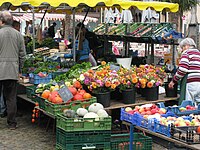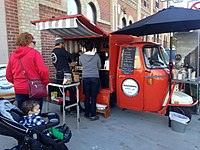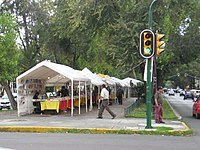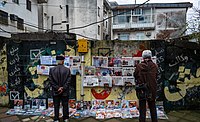Proposal:Street vendors
| Street vendors | |
|---|---|
| Proposal status: | Abandoned (inactive) |
| Proposed by: | Freetz |
| Tagging: | amenity=street_vendor
|
| Applies to: | node |
| Definition: | This key is used to mark a place where a street vendor returns to on a fixed schedule to trade goods or services. |
| Statistics: |
|
| Draft started: | 2022-10-22 |
| RFC start: | 2022-11-07 |
This proposal is up for adoption by anyone who like its essence.
Proposal
To deprecate street_vendor=* and to tag mappable street vendors with amenity=street_vendor + vending=* + opening_hours=* instead.
Definition of a mappable street vendor
A street vendor trades goods or services on the street (outdoors, or indoors in a publicly accessible building) and not from a permanent shop. A street vendor is mappable in OpenStreetMap if they return to a fixed location on a fixed dependable schedule that can be captured using opening_hours=*.
A street vendor may sell any kinds of goods or services. A street vendor may be the only retailer at a location, or they may be one of several merchants at a market (e.g. farmers markets, food truck courts).
amenity=street_vendor implies that no signs and traces of the vendor may be present at the location even during its tagged opening_hours=*, for example because of severe weather conditions, special events, vacations, outdated opening_hours=*, etc.
The vendor displays their products and services publicly at all times while present and the vendor is easy to recognize as such by the general public (no hiding in presence of law enforcement, no codes). Products are sold and services are provided on the spot and in public space (the actual service may be hidden by screens etc). Products may be presented or prepared, for example, on carts, on portable tables, in portable or partially dismantled stalls or stands, on the ground, in tents, under canopies, in mobile vehicles or trailers, or by a person carrying, holding or wearing the products for sale. If the retail stand is not permanently present 24/7 year-round, including when closed or on vacation, a retailer may only be mapped as a street vendor (However, leaving the stand behind after business hours does not automatically make them a shop but they are still a street vendor).
Examples that are not street vendors
A mobile stand where a seller offers goods or services just outside their shop is not a street vendor, neither are individuals offering services that are not performed at the same place where they meet their customers. Businesses that sell goods through a window from within a building to people in the street constitute a normal shop and are not a street vendor. Farmers who sell their produce on their own premises are not street vendors, even if retail stands are not permanent, but may be tagged as a farm shop. Gamblers and performance artists are not street vendors.
Rationale
Why distinguishing between street vendors and shops?
Street vendors are mobile and potentially volatile retailers who are not permanently present at a location. Thus, street vendors differ significantly from shops which are present at any time. This makes street vendors unreliable features for navigation ("Turn right after the Name X coffee shop", or "Let's meet at food truck in the city park" only makes sense if the POIs exist.) but also for static map rendering (It is not useful to draw an element that is only present at certain times). Local laws also usually differentiate stationary retail from street vendors. Some jurisdications require retail shops or fast food stores to have restrooms for customers. If someone wanted to know how many retail shops there are in a spefic area, they are most likely not interessted in street vendors.
The differences between mobile and stationary shopping features are relevant and must be captured in OSM to warrant good quality of data.
What is the problem with street_vendor=yes?
To indicate street vendors in OSM, street_vendor=yes applied to shop=* (or amenity=fast_food) was drafted 4.5 years ago.
street_vendor=yes is not a good scheme because it necessitates data consumers to check for this tag to confirm that an amenity is actually permanently present. Permanent presence can only be concluded if street_vendor=no was tested positive, or if no street_vendor=* was found on a particular element.
This is absurd. The major idea behind maps, including OSM, is to represent physical features that are on the ground permanently. OSM elements do not have a tag that decribes when a feature exists. street_vendor=yes overturns this principle and renders undefined whether an OSM element is on the ground permanently until street_vendor=* is checked in one way or the other. Hence street_vendor=yes is incompatible with the commonly accepted meaning of data in OSM. street_vendor=yes meets exactly the description of a trolltag (e.g. "Data consumer [...] should not be expected to check for [...] completely_fictional=yes,[...]." and "Adding tags like proposed=yes is a really poor idea. It is a trap for data consumers not supporting them and it will lead to invalid and highly misleading data.")
A separate tag, such as amenity=street_vendor, that is specifically designed to represent temporary features, and that requires an additional tag describing when the feature is present, is a possibility to include street vendors in OSM in a way that is compatible with existing fundamental principles.
The proposal draft for street_vendor=* was never finalized and this tag was never put to the vote. So far it is only used on approximately 400 elements. It seems unlikely that many mappers consider using this tag and that many consumers evalute this tag. Said problems and its little use justify its deprecation.
Why vending=*?
Street vendors usually have a very narrow product range compared to stationary retail shops. Thus the values in shop=* are often too generic and too broad to adequately describe a street vendor. To realistically inform an OSM user what products and services they may expect from a street vendor, a scheme that allows for more precision is required. Adopting vending=* from amenity=vending_machine seems to be a better fit for accurate descriptions of street vendors. Addtional values of vending=* are needed, which may be also useful for amenity=vending_machines. The vast majority of street vendors is probably reasonably well described by five or less values in vending=*, and unhandy chains of multiple values seem unlikely.
To standardize the naming, using the plural form of the goods sold is proposed - unless a plural form does not exist or is not commonly used.
Tagging
amenity=street_vendoris applied to nodes , only. The node is placed at the approximate fixed location of the street vendor.
, only. The node is placed at the approximate fixed location of the street vendor.
- If the location is not fix within 15 meters around the node, the street vendor is not mappable as a
amenity=street_vendor. - If a street vendor is present at different fixed locations at fixed times, each location is a separate node.
- If the location is not fix within 15 meters around the node, the street vendor is not mappable as a
opening_hours=*is required and describes when vendor is present and selling.- If opening hours cannot be entered, the street vendor is not mappable as a
amenity=street_vendor.
- If opening hours cannot be entered, the street vendor is not mappable as a
vending=*is required and describes the goods or services predominantly offered (semi-colon separated list).- Additional tags that might be useful include
source=*source:opening_hours=*opening_hours:url=*check_date:opening_hours=*: The date when the opening hours was last checkedname=*(for signed names only)noname=yes(if no name is signed)operator=*(only if relevant, use business names only, no personal names)website=*description=*indoor=no/yes(avoidoutdoor=*)outdoor_seating=yes(use only for outdoor street vendors)indoor_seating=yes(use only for indoor street vendors)organic=no/only/yessecond_hand=only/yespayment=*
- A node with
amenity=street_vendorshould not be removed without reviewing itsopening_hours=*; if no updated schedule can be identified (due diligence) or cannot be entered inopening_hours=*, the node should be deleted. - Some select existing and new proposed values for
vending=*are listed below. Mappers may invent new values as needed. The plural form should be used for products unless a plural form does not exist or is not commonly used.
| tag value | additional tags | example goods or services | Notes |
|---|---|---|---|
| Edibles | |||
vending=breads |
breads, pretzels, rolls, etc. | ||
vending=candies |
candies, chocolate, cotton candy, lollipops, etc. | ||
vending=cheese |
|||
vending=coffee_beans |
coffee beans (ground or unground) | vending=coffee exists for coffee drinks
| |
vending=drinks |
drink:*=* |
brewed coffee, espresso, sodas, water, etc. | vending=drinks + drink:coffee=yes or drink:espresso=yes preferred over vending=coffee to mitigate potential for confusion
|
vending=fast_food |
cuisine=* |
street food for immediate consumption, sales of beverages is not implied | Since a fast food street vendor (in contrast to a fast food shop/restaurant) may not sell beverages, it is recommended to explicitely add vending=drinks + drink:*=* if beverages are sold
|
vending=fruits |
apples, bananas, cherries, etc | ||
vending=honey |
|||
vending=ice_cream |
gelato, frozen yogurt, ice cream, sorbet, etc. | ||
vending=meat |
|||
vending=pastries |
brownies, cakes, croissants, muffins, pies etc | ||
vending=spices |
|||
vending=vegetables |
lettuce, potatoes, tomatoes, etc. | ||
| Commodities | |||
vending=adornments |
bracelets, earrings, necklaces, etc. | ||
vending=art |
|||
vending=books |
|||
vending=brushes |
|||
vending=carpets |
|||
vending=clothes |
clothes=* |
||
vending=electronics |
|||
vending=fish |
|||
vending=flowers |
|||
vending=hats |
|||
vending=newspapers |
|||
vending=soaps |
|||
vending=souvenirs |
|||
vending=sunglasses |
|||
vending=swimwear |
bathing suits, beach towels, etc | ||
| Services | |||
vending=hairstyling |
|||
vending=manicure |
|||
vending=massage |
massage=* |
||
vending=pedicure |
|||
vending=psychic_reading |
|||
vending=shoeshining |
Stationary and mobile vehicles and trailers
Vehicles or trailers used for vending may or may not constitute a street vendor. It may be difficult to conclude whether a vehicle is stationary or mobile. If in doubt, it is better to assume that a vehicle or trailer is non-stationary than falsely using tags that imply permanent presence. Use the following guidelines:
| Appearance | Recommended tagging | Remark |
|---|---|---|
| Vehicle or trailer has an official license plate that indicates current registration | amenity=street_vendor |
vehicle is licensed to move in public traffic, assume that it will |
| Vehicle or trailer is parked on public land | amenity=street_vendor |
assume mobile use (most likely) unless superseded by other information |
| Vehicle or trailer is parked on private property | amenity=street_vendor |
assume mobile use unless superseded by other information |
| Vehicle or trailer is blocked by permanent obstacles such that it cannot be driven or towed away without major disentanglement | stationary tags | |
| Vehicle or trailer appears to be not roadworthy and cannot be moved without major repair or heavy machinery | stationary tags |
Examples
Features/Pages affected
street_vendor=*- declare deprecatedamenity=street_vendor- createvending=*- update and include use inamenity=street_vendorshop=snack- removestreet_vendor=yesreferencesphysically_present=no- removestreet_vendor=yesreferences
External discussions
References
https://www.practicaladultinsights.com/what-is-a-street-vendor.htm
https://www.findlaw.com/smallbusiness/starting-a-business/how-to-become-a-street-vendor.html
Comments
Please comment on the discussion page.









